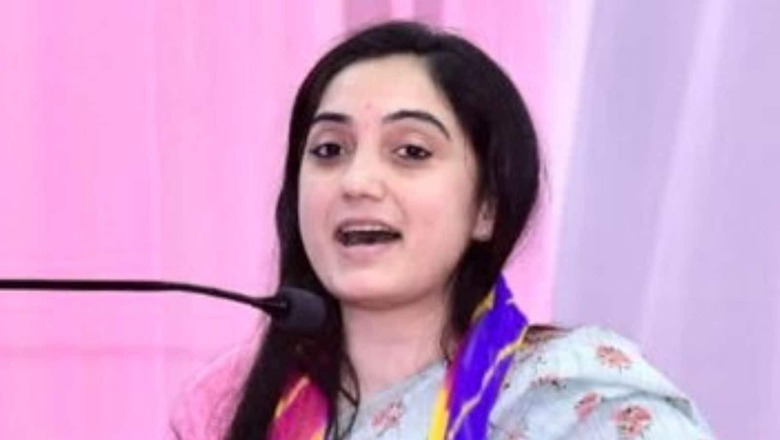
views
Nupur Sharma’s suspension from the BJP pending further inquiry for her remarks on Islam, and Prophet Muhammad in particular, on a television channel debate, invited strong reactions from the party’s supporters.
From alleging that the BJP caved to the mob, to remarking that the party routinely betrays its supporters and throws them under the bus, the outrage is visibly palpable.
Some reasons for the outrage are, indeed, compelling. While many have made fun of Hindu gods and goddesses without any consequences, remarks on Islam have been met with the strong force of the law or, worse, serious violence and death. The evident inequality in the systemic response to such attacks on religion has left many frustrated and angry.
And it is perhaps this very frustration and anger which seemingly led Nupur to launch a tirade against a Muslim panelist on the debate who mocked the discovery of a shivling in the premises upon which the Gyanvapi mosque was built.
Her tirade resulted in widespread outrage among the members of the Muslim community and eventually, West Asian countries such as Qatar, Kuwait, and Iran as well as the OIC stepped in to condemn these utterances and summon Indian foreign service officials in those countries.
What made it an impossible decision for the BJP was the fact that the party was labelled guilty by association. Nupur Sharma represented the BJP on the primetime debate and the BJP is the ruling party at the Centre.
So what if these nations are outraged? How can a handful of nations bully a major democratic force such as India? Such questions may well be asked.
What this armchair outrage overlooks is that, when it comes to actual governance, those in power are often faced with impossible decisions such as these. India’s reliance on many of the Islamic countries for its critical needs is well-known. In the India Story which has taken shape for decades and, in particular, since this current dispensation came into power in 2014, relationships with West Asian countries have been vital.
From former Minister of External Affairs Sushma Swaraj to the current minister S Jaishankar, the Modi government has assiduously established goodwill and gained diplomatic capital which it expends from time to time for India’s benefit.
So what? Why can’t India push back against this outrage by the Islamic nations? After all, France, for example, publicly permitted the projection of the Charlie Hebdo cartoons onto government buildings. When will India develop a spine?
What the BJP and the government of India did wasn’t quite caving in. It ideally wouldn’t have preferred to be faced with such an impossible decision. But once required to confront it, the decision it took is a rational one. There are several reasons for it.
First, while one can endlessly argue over whether or not what Nupur said are facts, she did evidently lose her marbles when provoked by a Muslim panelist on the debate. Rather than attack the panelist as is routine in these high adrenaline debates, she chose to attack the religion and its Prophet directly. It wasn’t a mere citation from a religious text. The tone and tenor were clearly intended to offend.
Second, her utterances or parts thereof are arguably proscribed under our own laws — in particular, the Indian Penal Code. Whether or not those laws should remain on the books and, indeed, whether or not they are applied equally is a different matter. How possibly could India have expanded its capital to defend something that, quite likely, attract some provisions in its own laws?
Third, and most importantly, how and to what extent India should spend its diplomatic capital is a decision that cannot and should not limit itself to the benefit of an individual or even a political party. The BJP’s own motto is — nation first, party next and the self last. And even if that wasn’t its motto, any party which rules a nation ought to live by that. Any diplomatic leverage India may have over the Islamic countries is solely and exclusively for India’s benefit. That means the larger interest of the Indian public at large.
In Qatar, for example, over 600,000 Indians reside and work. Ensuring that no retaliatory act — whether mild or strong — is taken against Indians ought to be the government of India’s priority. In the wake of global uncertainty over the supply of oil, for example, if India were to alienate its valuable trading partners, it would be extremely myopic. India has time and again enjoyed safe passage by many Islamic countries in order to evacuate its nationals during crises.
Did the BJP, which often calls itself a family-like organisation, throw a member of its family under the bus? Some members of the party may feel this way.
What this line of thinking entirely misses is the fact that the most important objective of the ‘BJP family’ is to serve India’s interests. If those interests come into conflict with the interests of an individual family member (who has recognised that she may have hurt sentiments and has, resultantly, withdrawn her words), the decision taken ought not to be a surprise.
None of this is to condone in any manner the threats Nupur faces of serious violence or death. She must be offered the full protection of the State against barbarism. Yet, that same State cannot be called upon to make a decision that could likely go against the larger interests of the nation.
In the relationship between India and the Islamic countries, this unfortunate episode cannot be a hill for the Indian State to die on.
The author is a lawyer and author of the book ‘The Smriti Irani Story: Why She Won Amethi’. The views expressed in this article are those of the author and do not represent the stand of this publication.
Read all the Latest Opinions here

















Comments
0 comment